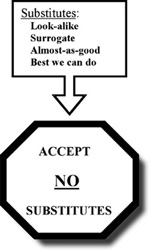
Now that the election is finally over, can we move on to something substantive like healthcare? This is the middle piece in a three-part series to help YOU DECIDE about our healthcare system: what will fix it and what will not.
Taken from my book Medical Malprocess, the "Quorum of Questions and a Chant" is a guide that you can use to assess for yourself any Proposal for healthcare, whoever offers it. No translation required. You do not need a PhD, MD or MBA to decide whether whatever they offer is what you want.
The first two self-help Questions were already posted as well as the reminder to treat causes not symptoms. Below are Questions Three and Four of the Quorum of Five.
Question 3 (of 5)
Are the incentives right (or are they perverse)?
Stephen Kerr said it better than I can when he wrote his famous article (1973) titled "On the folly of rewarding A While hoping for B." He was describing perverse incentives, which unfortunately are all too common.
The patient wants as much time as needed with the provider - the B result: what we are "hoping for." Nurses and doctors are paid according to how efficient they are - that is A: what the system rewards. An "efficient" doctor or nurse spends the least time with one patient in order to see the most patients. The financial incentives (A) encourage the exact opposite of what we want (B). Why are we surprised when we get A and not B? Kerr was right on the money: perverse incentives.
So, Question #3 is: are the incentives right - do they reward providers to maintain or restore our health? If any proposed Plan for Healthcare fails to have positive incentives that encourage the outcomes we want, reject it. Accept no substitutes.
Question 4 (of 5)
Will our care get better and better (and better)?
Jerry Lewis' telethons for muscular dystrophy. The pink ribbons for breast cancer. Everyone wants and hopes for better care tomorrow than we have today. Few however think it through. The system we now have discourages (!) improvement.
How you improve anything: your golf swing, bowling score, work performance or relationships with others? Answer: by trying something and learning from the attempt. Whether you try something never done before or just something new-for-you involves RISK.
Risk is not a dirty word (unless connected to subprime lending practices.) We need to encourage not deter the risk-takers. Without them, care providers would never have learned how to treat heart disease, some cancers, and most infections. But medicine is still quite primitive. The "treatments" are rarely true cures. They just make us feel better or make a condition go away, and often at a terrible cost. (Think chemotherapy or open-heart surgery.)
What does our current system measure most carefully? Answer: following regulations. The worst sin is being "out of compliance," which means doing something other than what the regs say. There is no evidence for most healthcare regulations yet they are enforced as though they were medical gospel. What is the opposite of regulatory compliance? Answer: risk-taking. Reprising Stephen Kerr in Question #3 above, what do we incentivize (A) - in this case punish - and what do we want (B)? Perverse incentives strike again.
There are better ways to treat diseases and better ways to deliver care. To find them, we the public must encourage risk-takers to try, test and learn. Right now, we punish those who do not follow the rules and stigmatize those who suggest something new or different.
Any Plan for Healthcare should provide positive incentives to take risks and should sweep away the regulatory bureaucracy that is supposed to assure us good care but does the opposite. If the proposed Plan does not do what we want, reject it.
ACCEPT NO SUBSTITUTES.
To be concluded: part 3 of 3 is coming.